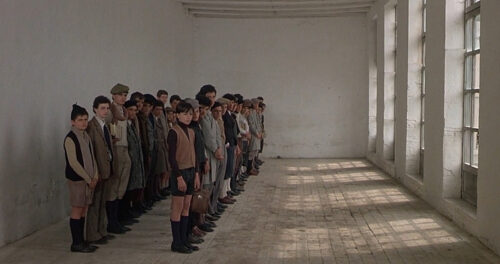[2]
During World War II, four fascist leaders round up a group of adolescent boys and girls to torture for one-hundred-twenty days. Just knowing what Salò is about kept me from watching it for decades. But now that I’ve finally seen it, I can safely say I’ll never want to see it again — not because it’s too graphic or upsetting, but because it’s point of view is not one that I appreciate.
For the most part, we do not experience Salò through the eyes the young victims. If we did, we might feel something for them — even if it were only hope for their escape. It would then be a horror film I might be able to enjoy in an emotional roller-coaster sort of way. But Salò spends more time putting us inside the heads of its villains, who take time to dress ceremoniously and wax philosophic between offenses. It’s not that I’m opposed to films that tell a villain’s story — but these villains are beyond redemption and unworthy of any empathy. Why writer/director Pier Paolo Pasolini would attempt to normalize them and inoculate us to their crimes is beyond my comprehension.
There is one scene that comes close to transporting us into the victim’s perspective. When one of the young women begins to cry for the murder of her mother, the fascists torture her by defecating in front of her and making her eat the fresh shit with a spoon. This is the only time we ever see one of the victims react emotionally to their capture and torture. But the introduction of feces also becomes the height of the film’s depravity. I could probably handle any other visceral horror Salò has to offer, but shit crosses the line for me. Shit takes me right out of the movie. Shit makes me pray for the credits to roll. And unfortunately, shit isn’t isolated to just this one scene — it becomes a regular part of the movie’s mise en scène.
Pasolini stages actors within the frame in an elegant, painterly way. The sets, locations, and wardrobe are sometimes remarkable. And the acting from the fascist leaders is wickedly nonchalant. Maybe there are some who can find content to appreciate here, but without a sympathetic point of view, Salò only succeeds in alienating me.

